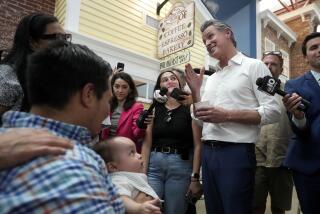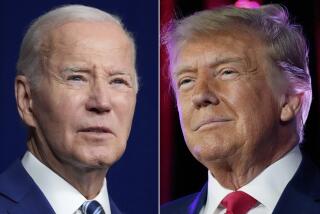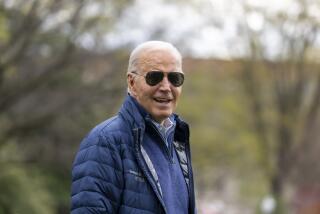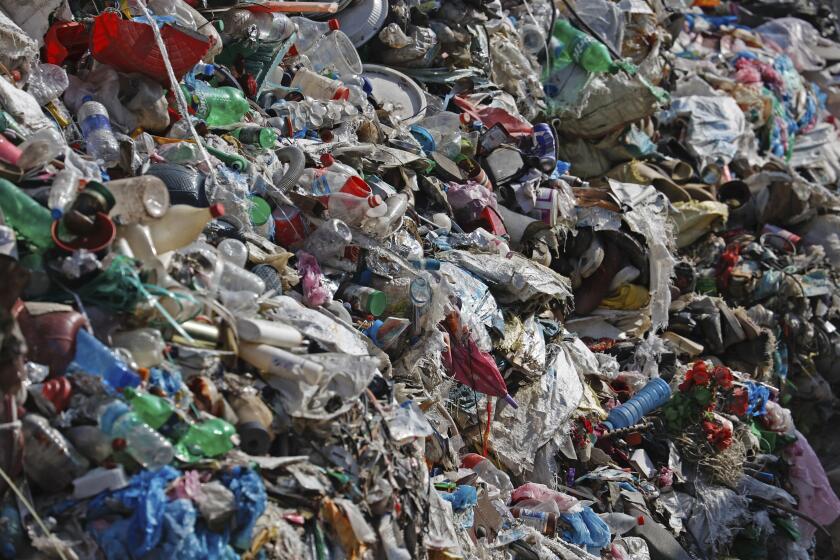Nominations may be decided in one quick blitz
Veteran political writers Don Frederick and Andrew Malcolm offer irreverent takes on the 2008 campaign.
•
After months of suspense, New Hampshire on Wednesday scheduled its presidential primary for Jan. 8 -- the state’s earliest date ever -- in a move that promises one of the swiftest nominating fights in campaign history.
With Iowa casting the first votes Jan. 3 and more than 20 states holding primaries or caucuses Feb. 5, the nominees for the White House could be decided in a one-month blitz of balloting -- and possibly in just a handful of days, if a candidate manages to win both Iowa and New Hampshire.
In the meantime, the presidential hopefuls will campaign nonstop through a holiday season that usually offers a break from politics, halting only for Thanksgiving and perhaps again on Christmas.
“We fully expect candidates working the Communion line at St. Joseph’s on Christmas Eve,” said Fergus Cullen, chairman of the New Hampshire Republican Party, who was only half-kidding. “There is no precedent, no protocol. I suspect the campaigns will be pushing the envelope as far as they think they can get away with.”
Although the date for New Hampshire’s first-in-the-nation primary was no surprise -- the campaigns had Jan. 8 circled in pencil -- the announcement set off a new round of speculation about which candidates might be helped or hurt.
The contests in Iowa and New Hampshire -- which have drawn the vast majority of the candidates’ time and attention -- are both exceedingly fluid, with the results in the first expected to heavily influence the outcome in the second.
The one certainty is that big states like California, Florida and Michigan will not carry the weight they sought by scheduling their contests earlier than in previous elections. “It’s obvious that the disproportionate influence of Iowa and New Hampshire is alive and well, and will live in 2008,” said Northeastern University political scientist William Mayer.
The announcement Wednesday by New Hampshire Secretary of State William M. Gardner laid the last important piece of the campaign calendar into place, ending a guessing game that kept candidates and their political strategists on edge for the better part of the year. Gardner acted a few hours after the Michigan Supreme Court cleared the way for that state to holds its primary Jan. 15, overturning a lower-court order.
New Hampshire law requires the state to hold its primary at least a week before any similar contest, and Gardner said repeatedly that he would do whatever it took to enforce that statute, even if it meant scheduling the vote in December. “Another unique American tradition will endure,” Gardner told reporters in Concord, N.H., after choosing the Jan. 8 date. “This tradition has served our nation well, as decades of candidates and presidents have said.”
Others were less pleased. Susan MacManus, a political scientist at the University of South Florida, said the outsized role of Iowa and New Hampshire -- “two almost all-white” states -- had again thwarted efforts to introduce more diversity into the presidential nominating process. Democrats set that goal last year, when they allowed Nevada and South Carolina to join the early voting in January. “What it says is we haven’t accomplished a thing,” MacManus said.
Florida is among the states facing sanction -- a loss of delegates to the presidential nominating conventions -- for scheduling its vote for Jan. 29, outside the window prescribed by the national political parties. New Hampshire and Michigan are also facing the penalty, although the eventual nominees are expected to override the parties for the sake of preserving unity.
Indeed, in a statement praising New Hampshire’s announcement Wednesday, Republican candidate Mitt Romney said he would work to ensure that all of the state’s delegates were seated at the GOP convention.
Iowa -- which holds caucuses instead of a primary -- and New Hampshire have long been the envy of other states, which are jealous of the time and money lavished upon them by presidential hopefuls who spend months, and sometimes years, campaigning there.
In an effort to increase their importance in the nominating process, California and other states pushed their elections forward in hopes of enticing candidates to come and do more than raise money to spend in Iowa and New Hampshire. That, in turn, spurred additional states to move ahead on the calendar, resulting in a game of leapfrog that produced what amounts to a national primary on Feb. 5, and, unintentionally, more clout for the small states voting first.
“Given how front-loaded this process is, if any candidate is going to defeat the front-runner, the only way they can do it is by making a dent in Iowa and New Hampshire,” said Mayer, who has written extensively on the presidential nominating process. “From the perspective of the front-runner, it’s how do you protect your lead? You campaign heavily in Iowa and New Hampshire.”
The early start also means presidential hopefuls face an unprecedented season of holiday campaigning that promises to test the limits of public patience and inject new uncertainty into an already volatile race.
Among the tricky questions of yule-time etiquette: Is it OK to run a slashing attack ad during commercial breaks from “It’s a Wonderful Life”? How about handing out caucus recruitment cards alongside Salvation Army bell-ringers in Iowa?
Tom Vilsack, the former governor of Iowa and a key advisor to Democratic Sen. Hillary Rodham Clinton of New York, said White House hopefuls were entering “new territory, new ground, and we’re all going to have to tread lightly.”
“It’s pretty fair to say people aren’t going to be too thrilled with telephone calls that break up their . . . holiday meal or any kind of religious celebration,” Vilsack said. “They’re not going to appreciate a barrage of negative comments or negative campaigning, before Dec. 25 anyway. After that, it may be easier to do.”
Campaigning during the holidays will present other challenges. TV spots are costlier, and there is more competition from retail advertisers. All those greeting cards and packages can bog down the postal system, which can affect the delivery of carefully timed direct-mail pitches. And many people leave town, making voter contact -- an integral part of a campaign’s turnout operation -- a lot tougher.
But the hardest thing may be adopting the appropriate tone, particularly in paid advertisements, which remain the most effective way of reaching voters.
“You don’t want to be too intrusive,” said Tom Rath, a veteran New Hampshire Republican strategist who is advising Romney. The former Massachusetts governor had been running ads bashing Clinton and swiping at Republican rival Rudolph W. Giuliani, but switched in the days before Thanksgiving to a softer-focus spot featuring swelling violins and home movies of his wholesome-looking family.
“You’ve got to find the right pitch,” Rath said. “I’m not sure a very blatant, cutting-edge negative ad campaign will work during the season of good will toward man.”
Times staff writer Stuart Silverstein contributed to this report.
More to Read
Sign up for Essential California
The most important California stories and recommendations in your inbox every morning.
You may occasionally receive promotional content from the Los Angeles Times.










